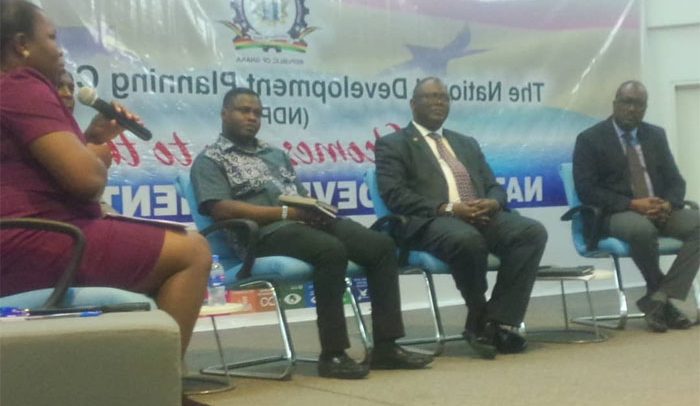Mr. Ali-Nakyea(second from right) and other panelists.
The National Development Forum in a bid to address the issues of corruption in the country, has held a conference on the theme “Confronting the menace of corruption in Ghana”.
The forum had in attendance some key stakeholders from various sectors of the country to discuss the way forward on corruption related issues which is said to be rampant in different fields in the country.
According to Abdallah Ali-Nakyea, Managing Partner, Ali-Nakyea and Associates in a key note address, nepotism, fraud, extortion are some forms of corruption.
“Corruption manifest itself in these forms – Bribery of a public officer, Bribery by a public officer, Receiving a bribe before doing an act and Promise of a bribe”.
He said that the giver of a corrupt act is equally guilty as the receiver.
Mr. Ali-Nakyea said a research conducted by Ghana Integrity Initiative, Ghana Anti-Corruption Coalition and Send Ghana make public that Ghana losses about 30 percent of its Gross Domestic (GDP) to corruption while 70 percent of Ghanaians have affirmed to experiencing corruption practices in the education and government sectors respectively.
He added that “an estimation of 52 percent of Ghanaians have paid bribes, were asked for payment of bribes or have collected a bribe in the health and education sectors”.
Richard Quaisoon, Deputy Commissioner of Committee for Human Rights and Justice (CHRAJ) in his findings, make known that “Ghana losses 13 billion cedis yearly to corruption representing more than 300 percent of the 2016 annual budget estimate” emphasizing that the loss of money amounts to 3 billion dollars hence, Ghana has no need for aid.
“Ghana losses 3billion dollars to corruption” disclosed by Ghana Integrity Initiative. This is however, accounted to non punishment of perpetrators which have encouraged people to escape with their corrupt acts, he said.
He further noted that in the 2018 Corruption Perception Index report of Transparency International, it was revealed that Ghana is the 78th country out of a total of 175 corrupt countries but has moved averagely from 64.71 from 1998 until 2018, reaching an all time high of 81 in 2017 and a record low of 50 in 2002.
He further noted that corruption retards the growth process of the country, good governance and the ability to provide public service since it is a crucial element in the economic under performance and a major obstacle for poverty reduction of a country.
Mr. Ali-Nakyea, suggesting ways to combat the situation, stated that some measures had been taken towards minimizing corruption but the situation remains same.
He said nonetheless government can enforce and implement existing legislature compared to creating new policies to improve on the fight against corruption.
He said that investment in technology will enhance the reduction of the human interface encountered in some processes involved with the purchasing of goods and service in the country.
He added that empowering various anti-corruption agencies and institutions in a manner that does not encourage political interferance will enable independency among anti-corruption agencies to thrive with various corruption issues.
He again added that society should be sensitized on the dangers of corrupt practices.
This, he said, will make citizens aware that their inclusion in corruption leads to the unfulfilled performances of provision for social amenities for the citizens in various societies in the country.
BY Jamila Akweley Okertchiri

